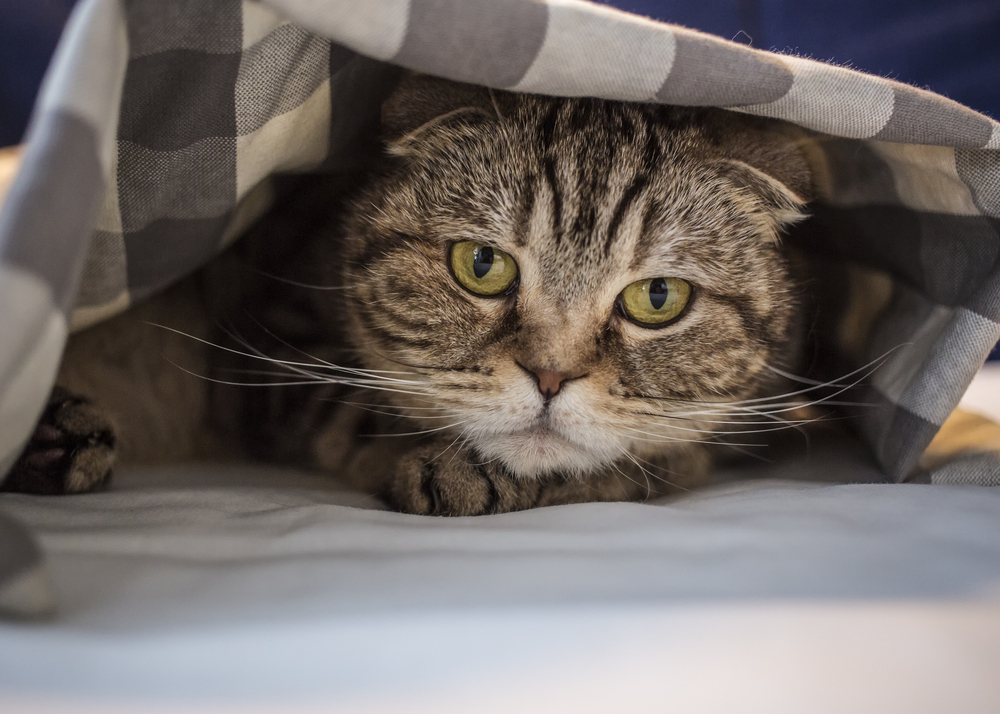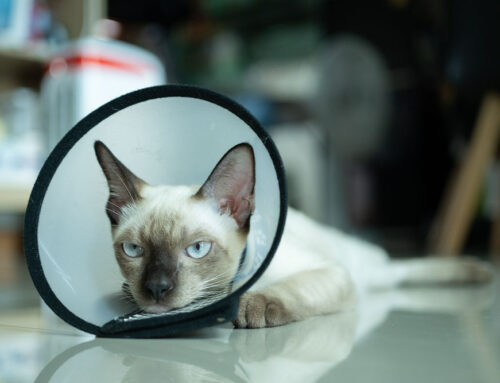A cat who is stressed can suffer serious health complications and behave inappropriately. Stress has been linked to urinary tract conditions, skin disorders, gastrointestinal (GI) disease, and respiratory illness. In addition, stress can cause unwanted behaviors, such as eliminating outside the litter box and destroying personal belongings. You should suspect your cat is stressed if they exhibit signs such as hiding more than usual, avoiding interaction with people and other pets, decreased appetite, and overgrooming, possibly causing hair loss and raw skin areas. Our Animal Medical Hospital of Naples team knows that stress can be extremely problematic for cats, so we explain why your cat may be stressed, and suggest tips to help remedy the problem.
#1: Illness and pain can stress your cat
Cats affected by health conditions such as diabetes, obesity, kidney disease, hyperthyroidism, and arthritis may experience stress. Cats are excellent at hiding pain and discomfort, and you may not know your cat is unwell. Tips to avoid health-related stressors include:
- Schedule regular wellness visits — Wellness visits are the best way to detect health complications in the early stages before your cat becomes stressed.
- Keep your cat at a healthy weight — Carrying excess weight can predispose your cat to numerous health complications.
- Provide appropriate dental care — Periodontal disease has been linked to kidney and heart disease, and other serious health problems. Promote your cat’s oral health by scheduling regular veterinary professional dental exams and cleanings.
- Be alert to subtle changes — Don’t discount subtle changes in your cat’s appetite, activity level, and behavior. If you notice your cat acting differently, contact our Animal Medical Hospital of Naples, so we can ensure they do not have a health problem.
#2: Boredom can stress your cat
Cats need physical and mental exercise to prevent boredom and keep them mentally engaged. Tips to provide enrichment for your cat include:
- Daily play dates — Schedule time daily to play with your cat. Laser pointers, ribbon, and wand-style toys are great toys that will motivate your cat to run and jump and get the exercise they need.
- Provide a window perch — Cats enjoy watching the birds and small animals outside, and a window perch lets them comfortably watch the show.
- Make mealtimes more exciting — Cats in the wild spend a lot of time hunting their prey, and indoor cats are not stimulated when you hand them their food in a bowl. Feed your cat in a food puzzle toy, so they use their brain to retrieve their meal.
#3: An unsatisfactory litter box set-up can stress your cat
Cats are persnickety about their litter box, and may become stressed if their set-up does not meet their approval. Tips to ensure your cat is pleased with their powder room include:
- Clean the box — No one likes to use a dirty bathroom. Scoop the litter box at least twice a day, and change out the litter about once a week.
- Provide enough boxes — Cats don’t like to share, and in a multi-cat home, you should provide one box for every cat, plus one extra.
- Ensure your cat has space — Your cat doesn’t want to be cramped when doing their business, so ensure their box is large enough.
- Provide privacy — Cats don’t like to be disturbed in their litter box. Place the box in a low-traffic area to protect your cat’s privacy.
- Ensure the box is easily accessible — Ensure your cat’s litter box is in a convenient location. If your home has multiple levels, place a box on every floor.
- Use the right litter — Most cats prefer only one to two inches of unscented, clumping litter.
#4: Introducing a new pet can stress your cat
Most cats don’t take well to new four-legged house members, and you must take the time to properly introduce your new pet to make the situation successful. Tips include:
- Keep the new pet separated — Allocate a room in your home for your new pet and provide all the resources they need.
- Exchange bedding — Exchange your cat’s bedding with your new pet to let them get used to each other’s scent.
- Make good associations — Feed your cat and new pet on either side of a closed door, so they can make good associations with their new friend.
- Introduce slowly — Allow your cat and new pet to meet through a barrier. Once they can calmly interact through the barrier, free them to make introductions.
Introducing your cat to your new pet can take several weeks. Don’t rush the process to prevent stressing your cat.
#5: Living in a multi-cat household can stress your cat

Cats who live in a multi-cat household are more likely to experience stress. You may think your cats get along, but unless they groom each other and touch while sleeping, they likely only tolerate one another. Tips to prevent stress among your cats include:
- Provide numerous resting areas — Cats don’t want to fight for a favored resting area. Provide numerous options, including elevated locations, so every cat can rest peacefully.
- Avoid feeding your cats together — Cats are extremely territorial about their food, so feed your cats where they can’t see each other. If one cat commandeers another’s food, keep them in a separate room until the others have finished eating.
- Provide several scratching options — All cats need to scratch, and each cat has a different scratching preference. Provide horizontal and vertical scratching areas in a variety of surfaces, such as cardboard, sisal, and carpet, throughout your home.
- Provide hiding places — Cats need alone time away from people and other cats. Provide enough hiding places for each cat to have an escape when they need a moment.
If your cat seems stressed, contact our Animal Medical Hospital of Naples team. We can help determine the source and remedy the issue before their health and behavior are affected.







Leave A Comment